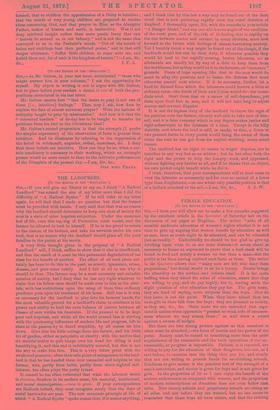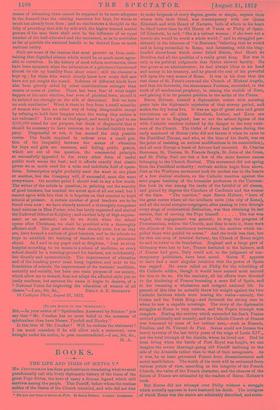FEMALE EDUCATION.
go THE EDITOR OF THE " SPEOTATOR,1
trust you will allow me to make a few remarks suggested by the excellent article in the Spectator of Saturday last on the discussion of my paper at Brighton. The writer "asks of all sensible moderate advocates of women's rights whether it is not time to give up arguing that women benefit by education as well as men, have as much right to be educated, and can be educated just as readily." Undoubtedly we should be too glad to give up dwelling upon what to us are mere truisms—it seems about as necessary to frame an argument to prove that a beef-steak will be found to feed and satisfy a woman no less than a man—but the public is far from having realised such facts as them. The writer in the Spectator allows that "many men are left who deny these propositions," but denial would to us be a luxury. Denial brings the absurdity to the surface and defeats itself. It is far more baffling when they admit the value of education, mat that they are willing to pay, and do pay highly, for it, leaving aside the slight question of what education they pay for. The girls learn, they are fond of saying, more subjects than the boys. Row do they learn is not the point. When they leave school they are more glib in their talk than the boys ; they are pleasant in society, as they are, &c., &a. Once more we are reminded that argu- ment is useless when opponents "present no weak side of common- sense whereat we may attack them ;" as well draw a !word against a swarm of midges.
But there are two strong powers against us that somehow or other must be attacked,—the force of inertia and the power of the purse. Society must be roused to something more than the quiet acquiescence of the reasonable and the tacit opposition of the un- reasonable, or progress is impossible. Fathers, it is repeated, are willing to pay for the education of their daughters, but not, as I said before, to examine into the thing they pay for, and clearly they are not willing to provide funds for establishing schools. Readiness to give money is the practical teat of the strength of a man's conviction, and money is given for boys and is not given for girls. In the proportion of 92 to 1 men enjoy the benefit of the ancient endowments as compared with women, and the proportion of modern subscriptions or donations does not even follow that ratio. New county schools and proprietary schools are rising on all sides, and not before they are wanted, but no one seems to remember that those boys all have sisters, and that the existing means of educating them cannot be supposed to be more adequate to the demand than the existing resources for boys, for whom so much has already been done ; and no one bestows a thought on the folly of providing that side by side with the higher trained mental powers of the men there shall ever be the influence of an equal number of the half-educated and the untrained, so as to neutralise as far as possible the national benefit to be derived from so much national outlay. _ Such are some of the reasons that must prevent us from main- taining that dignified silence which would be so much more agree- able to ourselves. In the history of most reform movements, there have been moments when the reiteration of a grievance has seemed almost to' stir up hostility from sheer ennui ; still the clamour is kept up ; for those who watch closely know how many dull ears have not yet caught the sound. Reforms of different kinds have also been greatly aided by other considerations stronger than reason or sense of justice. There has been fear of what might happen at the next election, fear even of physical force, should it be enlisted too strongly on the side of discontent. But we have no such auxiliaries ! What is there to fear from a small minority of women who have no other way of being disagreeable except by refusing to hold their tongues when the wrong they endure is not redressed ? You wish us God speed, and would be glad to see 1100,000 raised for our purpose, but think it disgraceful that it Amid be necessary to have recourse to a limited-liability com- pany. Disgraceful or not, it has seemed the only possible course. The funds required to redress even a small por- tion of the inequality between the means of education for boys and girls are immense, and failing public grants, which are out of the question, the commercial principle 80 successfully appealed to for every other form of useful public work seems the best; and it affords exactly that elastic power we so much need for a wide and indefinite field of opera- tions. Subscription might probably meet the want in one place or another, but the Company will, if successful, meet the want everywhere. On another point I should wish to say a few words. The writer of the article in question, in pointing out the scarcity of good teachers, has touched the sorest spot of all our need, but I cannot agree with him that it is hopeless on that account to build schools at present. A certain number of good teachers are to be found even now ; we have already secured a thoroughly competent head mistress in Miss Porter, who has lately organised and started the Endowed School at Keighley ; and another lady of high acquire- ment as an assistant; nor do we doubt when the school opens after Christmas, we shall be provided with a thoroughly efficient staff. The good schools that already exist, few as they are, have formed a nucleus of good teachers, and in the schools we hope to establish the training of teachers will be a prominent object. As I said in my paper read at Brighton, "Just as every hospital according to its means is a school of medicine, so every school should be a training-ground for teachers, not incidentally, but directly and systematically. The improvement of education and of the teaching power must hang together, and next to the foundation of schools, the improvement of the teachers' condition, mentally and socially, has been one main purpose of our society, which allow me to remark does not adopt the affected style you so justly condemn, but assumes the name it hopes to deserve, of a "National Union for improving the education of women of all



































 Previous page
Previous page